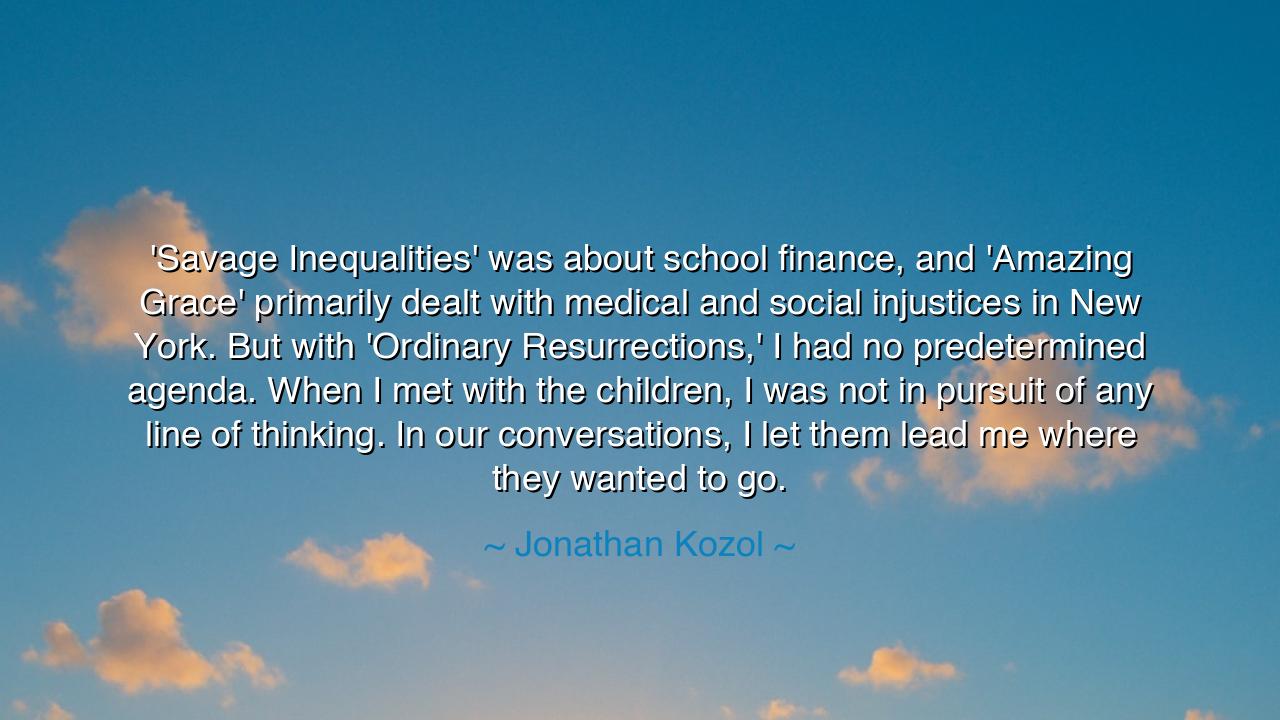
'Savage Inequalities' was about school finance, and 'Amazing
'Savage Inequalities' was about school finance, and 'Amazing Grace' primarily dealt with medical and social injustices in New York. But with 'Ordinary Resurrections,' I had no predetermined agenda. When I met with the children, I was not in pursuit of any line of thinking. In our conversations, I let them lead me where they wanted to go.






The words of Jonathan Kozol—“‘Savage Inequalities’ was about school finance, and ‘Amazing Grace’ primarily dealt with medical and social injustices in New York. But with ‘Ordinary Resurrections,’ I had no predetermined agenda. When I met with the children, I was not in pursuit of any line of thinking. In our conversations, I let them lead me where they wanted to go.”—reveal the heart of a seeker who listens more than he commands. In them lies a wisdom the ancients cherished: that the truest understanding is not forced, but received; that the voices of the humble often carry the purest truth. Kozol, who once raised his pen against the injustices of wealth and health, now shows us that in listening to children, he discovered a different form of resurrection—one born from presence, humility, and the willingness to be guided.
The ancients often wrote of sages who went to the marketplaces or the fields not to preach, but to sit among the people, hearing their stories, gathering wisdom like grain at harvest. Kozol’s Savage Inequalities thundered against the unfairness of school finance, exposing the broken systems that failed generations of the poor. His Amazing Grace lamented the medical and social injustices of New York, where poverty and disease chained the lives of the forgotten. Yet in Ordinary Resurrections, his spirit shifted: he laid aside his armor of agenda and came to the children not as an advocate, but as a companion. He let them lead, and in doing so, revealed that even the smallest voices can guide us toward truth.
There is power in this humility. Many who seek to reform the world impose their visions upon it, wielding authority as if they alone possess wisdom. But Kozol shows that to listen—to truly listen—is an act of reverence, for it acknowledges that even those who seem powerless carry within them the sparks of insight. The children he met were not policymakers or scholars; they were simply children, yet their laughter, their fears, their questions, and their dreams became the compass of his work. In this, he embodied the teaching of the wise: that greatness is found not in speaking, but in listening.
Consider the example of Socrates, who did not dictate but questioned, drawing out knowledge from the souls of those around him. His wisdom was not in providing answers but in teaching others to uncover the truth already dwelling within. So too did Kozol, by letting children lead, draw forth the unfiltered clarity of their voices. From them, he learned about hope, resilience, and the quiet acts of courage that adults too often overlook. In their innocence, he found a mirror to society’s failures and its possibilities.
The meaning of Ordinary Resurrections lies in its name. Resurrection is not always the thunder of miracles or the blaze of revolutions. Sometimes it is ordinary—the rebirth of dignity in a child’s laughter, the renewal of faith in a question asked honestly, the quiet rising of hope where despair once dwelt. By setting aside his predetermined agenda, Kozol opened himself to such resurrections, and through them, he was transformed.
The lesson for us is profound: do not enter every encounter with the arrogance of your own agenda. Approach others—especially the overlooked—with openness, humility, and reverence. Allow their words to shape your understanding, their experiences to expand your vision. In this way, you may discover truths no plan could ever uncover. The wisdom of the world is scattered among the lowly and the small, waiting for ears willing to hear.
Practical action lies within our grasp: parents, listen to your children not only as caretakers but as learners. Teachers, let students’ questions guide you as much as your curriculum. Leaders, seek the counsel of those you serve, not only the powerful who surround you. And each of us, in daily life, must learn to pause, to silence our own voices long enough to hear the fragile music of another’s soul. For it is in such listening that ordinary resurrections occur—renewals of love, of trust, of wisdom.
So let Kozol’s words stand as both torch and teaching. He reminds us that to fight against inequalities and injustices is noble, but to listen without agenda is divine. In the voices of children, he found resurrection; in our own listening, we too may find it. Let us go forth, then, not only as speakers of truth but as hearers of it, ready to be led where the quiet wisdom of others may guide us.






AAdministratorAdministrator
Welcome, honored guests. Please leave a comment, we will respond soon